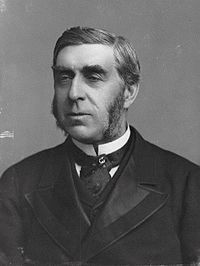George Joachim Goschen, 1st Viscount Goschen
|
The Right Honourable The Viscount Goschen PC |
|
|---|---|

George Goschen, 1883
|
|
| Chancellor of the Duchy of Lancaster | |
|
In office 26 January – 26 June 1866 |
|
| Monarch | Victoria |
| Prime Minister | The Earl Russell |
| Preceded by | The Earl of Clarendon |
| Succeeded by | Thomas Edward Taylor |
| Chancellor of the Exchequer | |
|
In office 14 January 1887 – 11 August 1892 |
|
| Monarch | Victoria |
| Prime Minister | The Marquess of Salisbury |
| Preceded by | Lord Randolph Churchill |
| Succeeded by | Sir William Vernon Harcourt |
| Personal details | |
| Born |
10 August 1831 London |
| Died | 7 February 1907 (aged 75) |
| Nationality | British |
| Political party |
Liberal Liberal Unionist Conservative |
| Alma mater | Oriel College, Oxford |
George Joachim Goschen, 1st Viscount Goschen (10 August 1831 – 7 February 1907) was a British statesman and businessman best remembered for being "forgotten" by Lord Randolph Churchill. He was initially a Liberal, then a Liberal Unionist before joining the Conservative Party by the time of the 1895 General Election.
While Chancellor of the Exchequer, in 1888 he introduced the Goschen formula to allocate funding for Scotland and Ireland.
He was born in London, the son of Wilhelm Heinrich (William Henry) Goschen, who emigrated from Leipzig. His grandfather was the prominent German printer Georg Joachim Göschen. He was educated at Rugby under Tait, and at Oriel College, Oxford, where he took a first in classics. He entered his father's firm of Fruhling & Goschen, of Austin Friars, in 1853, and three years later became a director of the Bank of England.
In 1863 he was returned without opposition as one of the four MPs for the City of London in the Liberal interest, and he was reelected in 1865. In November of the same year he was appointed Vice-President of the Board of Trade and Paymaster-General, and in January 1866 he was made Chancellor of the Duchy of Lancaster, with a seat in the cabinet. When Gladstone became prime minister in December 1868, Goschen joined the cabinet as President of the Poor Law Board, until March 1871, when he succeeded Childers as First Lord of the Admiralty. In the 1874 general election he was the only Liberal returned for the City of London, and by a narrow majority. Being sent to Cairo in 1876 as delegate for the British holders of Egyptian bonds in 1876, he concluded an agreement with the Khedive in order to arrange for the conversion of the debt.
...
Wikipedia
